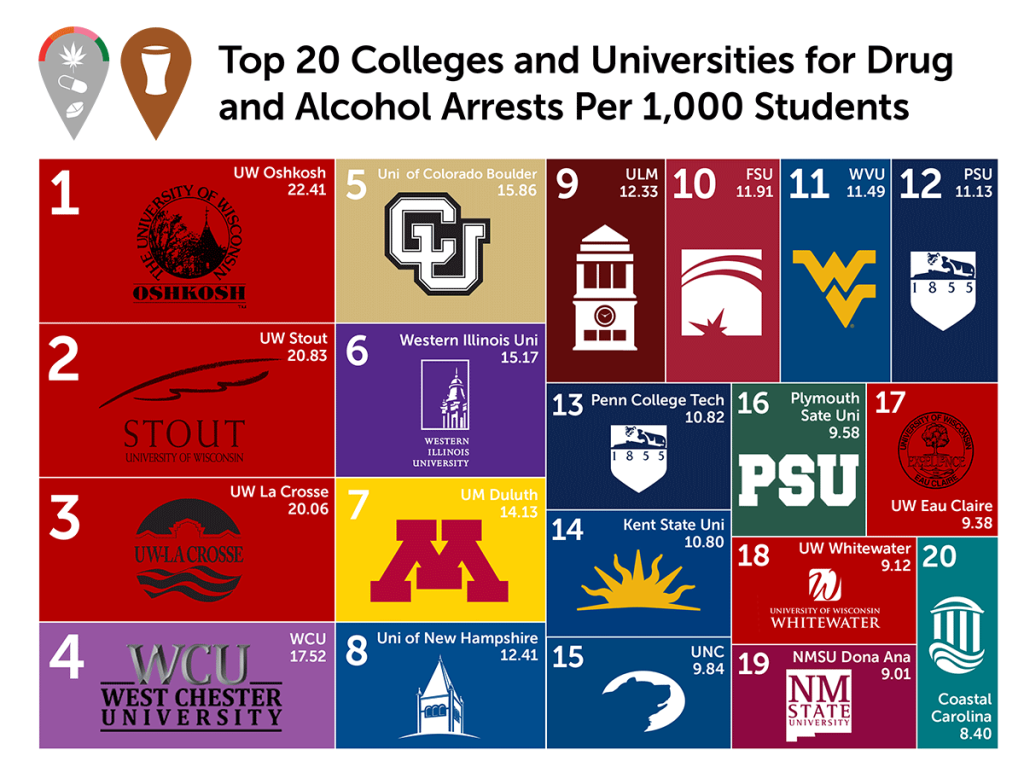UW-Eau Claire makes list of top alcohol and drug arrests
University credits high enforcement rates for top-20 ranking
February 13, 2014
In late January, Business Insider published an article ranking U.S. universities by on-campus drinking and drug arrests per 1,000 students. Along with four other UW System schools, UW-Eau Claire made the top 20.
The report names UW-Eau Claire as 17th in the nation for on-campus drinking and drug arrests, but the statistics aren’t as clear as they may seem.
The report used data from universities with a student body of more than 5,000 students. That constraint brought the number of universities down to a few thousand, compared to the approximately 7,000 universities in the nation. The report also used a broad definition of arrest. UW-Eau Claire Chief of Police, David Sprick said arrest can also mean tickets and citations, “not being hauled away by a squad car.”
A reputation for underage and binge drinking isn’t anything new to the Midwest, and while some university students may see the report as an example of Blugold party habits, others, like Dean of Students Joe Abhold, see the numbers as a high level of enforcement.
Abhold has worked within the UW System for 14 years. He said people generally know about Wisconsin and the Midwest’s alcohol use issues.
UW-Oshkosh, UW-Stout and UW-La Crosse took the first three spots in the top 20 list. Western Illinois University and University of Minnesota-Duluth also take spots for Midwest universities on the list.
Sprick said the statistics didn’t surprise him, but he didn’t expect Eau Claire to be ranked 17th nationally.
“(The numbers are) fairly consistent as far as underage drinking goes, as drug use goes,” Sprick said. “No peaks or valleys.”
A 2013 Center for Alcohol Studies and Education survey said 84 percent of Eau Claire students consumed alcohol in the past year. That compares to 81.8 percent of students in a national Core study. Core is the largest national database of alcohol and drug use in post-secondary educational institutions.
Core reports that 43.9 percent of students reported binge drinking in the two weeks prior to taking the survey, and Eau Claire reported 49 percent.
According to the CASE survey, in 2013 32.8 percent of students said they had used marijuana in the past year and 16.3 percent said they had used it in the past 30 days. CASE groups other illegals drugs into a single category. The results of the survey said 4.3 percent of students said yes to using illegal drugs in the past year and 1.3 percent said yes to the past 30 days.
Dating back to 2002 surveys, Eau Claire has seen a decrease in the number of students who report consuming alcohol in the past year, in the last 30 days and underage students who consumed alcohol in the past 30 days, but CASE Director Peggy O’Halloran said national numbers have decreased as well.
“We are above national levels, but we are closer,” O’Halloran said.
Interpretation
When the Business Insider article was initially released some students took to social media to express pride of their ‘party school,’ but Abhold said he has seen mixed responses from students, staff and faculty. While some embrace the idea, other have responded with dislike or an acknowledgment of the enforcement.
“Whenever situations like this come up, there are students who push back and say, ‘That’s not what I want my school to be known for,’” Abhold said. “I think we have to remember that the vast majority of the time, the vast majority of students are being responsible.”
Freshman Anne Zignego said she has friends and floor-mates who have received drinking citations in the dorms, so she can understand the number, but she isn’t proud.
“I think it’s a little disappointing,” Zignego said. “I’m not exactly happy with that number.”
Freshman Nate Oestreicher said the ranking doesn’t change the way he views the university’s reputation, because it doesn’t mean illegal activity does not happen on other campuses.
“I know plenty of other colleges (where students) get away with whatever they want,” Oestreicher said.
O’Halloran said she encourages anyone to look at the numbers with a more critical lense, and not just settle with the idea of Eau Claire as a ‘party school.’
“I saw it as we have a strategy of enforcement that goes along with other stuff we do around alcohol abuse on campus, and enforcement is a piece of that,” O’Halloran said. “It shows that police are enforcing policy and laws.”
Sprick said the university police work to enforce the law, but they aren’t unrealistic either. He said they realize students are going to break rules and laws — like underage drinking and drug use. University officials encourage students to be safe if they choose to participate in the activities.
“I think our community, our students have a pretty good relationship and understanding of trying to have some sort of balance of having a university in the middle of a city,” Sprick said. “As far as being respectful of neighbors who aren’t students … students recognize when lines have been crossed and enforcement is appropriate.”
Sprick called attention to the fact that the study only uses data from police records at universities.
“If a private university doesn’t have a police department … they might have the (administration) handling it or housing,” Sprick said. “They might not be bringing the police in.”
Moving forward, Abhold said he hopes anyone reading the report critically interprets the data and realizes Eau Claire takes student alcohol and drug use very seriously.
“As a campus we recognize there is the availability of alcohol, the temptation of alcohol,” Abhold said. “We address that through education and enforcement, and a lot of great things for students to do that don’t involve drinking.”


